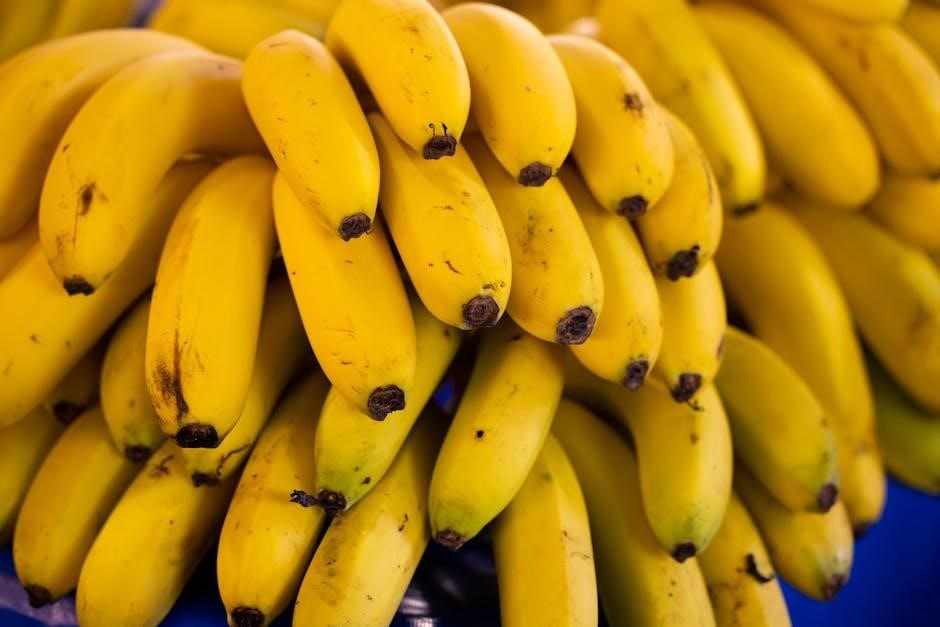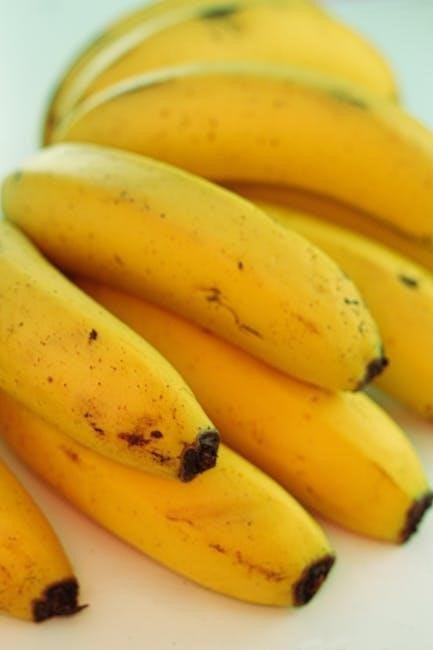Potassium-rich foods are essential for maintaining healthy bodily functions. They include a variety of natural sources like bananas, spinach, nuts, and whole grains, promoting overall well-being and energy.
Understanding the Importance of Potassium in the Diet
Potassium is vital for muscle and nerve function, heart health, and bone strength. It helps regulate fluid balance, supports nerve signaling, and counters sodium’s effects on blood pressure. Incorporating potassium-rich foods promotes energy levels, prevents muscle cramps, and supports overall bodily functions, making it a cornerstone of a balanced diet.
Overview of the 60 Richest Potassium-Rich Foods
The 60 richest potassium-rich foods include bananas, spinach, sweet potatoes, and nuts. These foods provide essential minerals, vitamins, and antioxidants. They support heart health, muscle function, and nerve signaling. Incorporating these into meals ensures optimal potassium intake, promoting overall well-being and energy.
Top 20 Potassium-Rich Foods
Bananas, spinach, avocados, nuts, sweet potatoes, and whole grains top the list of potassium-rich foods, offering essential nutrients for heart health and muscle function.

Fruits Rich in Potassium
Fruits like bananas, avocados, kiwis, and citrus varieties are excellent sources of potassium. Bananas are particularly notable, providing around 400-450 mg per medium fruit. Avocados also offer significant amounts, along with healthy fats. Kiwis and citrus fruits like oranges and grapefruits contribute to potassium intake while offering vitamin C. Incorporating these fruits into meals supports heart health and muscle function, making them a nutritious choice for balanced diets.
Vegetables Rich in Potassium
Vegetables like spinach, broccoli, and sweet potatoes are rich in potassium. Spinach provides over 800 mg per cup, while broccoli offers around 450 mg. Sweet potatoes are another excellent source, with approximately 700 mg per medium serving. Leafy greens such as Swiss chard and collards also contribute significantly to potassium intake, supporting muscle and nerve function. These vegetables are essential for a balanced diet.
Protein Sources High in Potassium
Protein-rich foods like lentils, beans, and nuts are excellent potassium sources. Lentils provide 731 mg per 100g, while almonds offer 718 mg. Cashews and pumpkin seeds are also high in potassium, supporting muscle function and nerve health. Incorporating these protein sources enhances dietary potassium intake, promoting overall well-being and energy levels naturally.
Other Potassium-Rich Foods
Beyond fruits and vegetables, other potassium-rich foods include nuts, seeds, and whole grains. Almonds, pumpkin seeds, and quinoa are excellent sources. Dairy products like milk and yogurt also contribute. Additionally, nutritional yeast and certain mushrooms are high in potassium, offering versatile ways to enhance your diet with this essential mineral for better health and energy.

Health Benefits of Potassium-Rich Foods
Potassium-rich foods support heart health, regulate blood pressure, aid muscle function, and promote nerve and bone health, essential for overall well-being and energy.
Heart Health and Blood Pressure Regulation
Potassium-rich foods play a crucial role in maintaining heart health by regulating blood pressure and counteracting the effects of sodium. They help reduce cardiovascular strain, promoting a healthier circulatory system and overall well-being.
Muscle Function and Cramp Prevention
Potassium is vital for proper muscle function, aiding in contraction and relaxation. A deficiency can lead to cramps and weakness. Incorporating potassium-rich foods like bananas, spinach, and nuts helps maintain muscle health and prevent discomfort, ensuring optimal physical performance and reducing the risk of muscle-related issues.
Nerve Function and Brain Health
Potassium plays a crucial role in nerve function by facilitating electrical impulses, essential for communication between nerves and muscles. Foods rich in potassium, such as bananas, spinach, and nuts, support brain health by maintaining optimal nerve function. Adequate potassium intake helps prevent fatigue, mental fogginess, and nerve-related discomfort, ensuring sharper cognitive function and overall neurological well-being.
Bone Health and Osteoporosis Prevention
Potassium-rich foods contribute to bone health by aiding calcium absorption and reducing excretion. Diets high in potassium, including leafy greens and nuts, help maintain bone density, lowering osteoporosis risk. This mineral supports skeletal strength, making it vital for long-term bone health and fracture prevention, especially in aging populations.
Dietary Recommendations for Potassium Intake
A balanced diet should include potassium-rich foods like bananas, spinach, and nuts. Adults need about 4,700 mg daily, achievable through diverse whole foods, ensuring optimal health.
Recommended Daily Intake of Potassium
The recommended daily potassium intake for adults is approximately 4,700 mg. This can be achieved by consuming a variety of potassium-rich foods such as bananas, spinach, nuts, and avocados. Ensuring adequate intake supports overall health, while excessive consumption should be avoided to prevent potential imbalances. Balancing whole, nutrient-dense foods helps meet this target effectively.
Best Practices for Incorporating Potassium-Rich Foods
Incorporate potassium-rich foods by preferring whole grains, nuts, and legumes. Opt for fresh fruits like bananas and avocados, and vegetables such as spinach and sweet potatoes. Limit processed and fried foods high in sodium. Stay hydrated to maintain potassium balance and ensure a varied diet for optimal nutrient absorption and overall health benefits.
Limiting Low-Nutrient, High-Potassium Foods
Focus on nutrient-dense potassium sources like fruits, vegetables, and whole grains. Limit processed snacks, fried foods, and chocolate, which are high in potassium but low in essential nutrients. Prioritize balanced choices to avoid excessive potassium intake while maintaining dietary variety and nutritional benefits.
Hydration and Potassium Balance
Adequate hydration is crucial for maintaining potassium balance, as water helps regulate electrolytes. Drinking 1.5 liters of water daily supports proper potassium distribution in the body. Excessive fluid loss can disrupt levels, while sufficient hydration prevents hyperkalemia. Balancing water intake with potassium-rich foods ensures optimal mineral equilibrium and overall health.

Managing Potassium Levels
Monitoring potassium intake is vital to prevent imbalances. Avoid excessive consumption of high-potassium foods and maintain hydration to support proper mineral balance and overall health.
Recognizing Potassium Deficiency (Hypokalemia)
Hypokalemia occurs when potassium levels drop below normal, causing symptoms like muscle weakness, fatigue, heart palpitations, and constipation. It often affects individuals with kidney issues, excessive sweating, or those using diuretics. Early detection is crucial to prevent complications, as prolonged deficiency can impair muscle and nerve function. Adequate dietary intake of potassium-rich foods is essential for maintaining healthy levels and preventing this condition.
Recognizing Potassium Excess (Hyperkalemia)
Hyperkalemia occurs when potassium levels exceed normal ranges, potentially causing nausea, muscle weakness, and irregular heartbeats. It often results from excessive intake of potassium-rich foods, kidney dysfunction, or certain medications. Severe cases can lead to cardiac arrest, making prompt medical attention critical. Monitoring potassium intake and balancing it with overall nutrition are essential to avoid this condition, especially for individuals with kidney disorders or those on specific medications.
Monitoring and Adjusting Potassium Intake
Monitoring potassium intake is crucial to maintain balanced levels. Track food consumption, especially high-potassium foods like bananas, spinach, and nuts. Regular blood tests can detect imbalances. Adjust dietary habits based on health conditions, such as kidney disease, and consult healthcare providers for personalized advice. Balancing intake prevents deficiencies and excess, ensuring optimal health and bodily function.

Potassium-Rich Food Categories
Potassium-rich foods are categorized into natural sources, whole grains, legumes, dairy products, and nuts. Examples include bananas, spinach, and almonds, each offering unique nutritional benefits.
Natural Sources of Potassium
Natural sources of potassium include fresh fruits like bananas and avocados, leafy greens such as spinach and kale, and root vegetables like sweet potatoes. These foods provide essential minerals and vitamins, supporting heart health and muscle function. Incorporating these into your diet ensures a balanced intake of this vital nutrient.
Whole Grains and Legumes
Whole grains like brown rice, quinoa, and oats are excellent sources of potassium. Legumes such as lentils, chickpeas, and black beans also provide significant amounts. These foods are rich in dietary fiber, vitamins, and minerals, making them a nutritious addition to a balanced diet while supporting overall health and energy levels effectively.
Dairy Products and Potassium
Dairy products like milk, yogurt, and cheese are moderate sources of potassium, supporting muscle and nerve function. They also provide essential nutrients like calcium and protein. Incorporating these into a balanced diet helps maintain overall health and energy levels, making them a practical choice for those seeking to boost their potassium intake naturally and effectively.
Nuts and Seeds High in Potassium
Nuts and seeds are excellent sources of potassium, with peanuts, pistachios, almonds, and walnuts being particularly rich. Pumpkin and sunflower seeds also contribute significantly. These foods not only provide essential minerals but also offer healthy fats and fiber, making them a nutritious addition to a balanced diet aimed at boosting potassium intake effectively.

Special Dietary Needs and Potassium
Special dietary needs require tailored potassium intake. Athletes may need more for performance, while vegetarians and those with kidney disease must carefully manage their consumption.
Potassium Requirements for Athletes
Athletes require higher potassium intake to maintain muscle function, hydration, and recovery. Potassium-rich foods like bananas, spinach, and nuts help replenish electrolytes lost through sweat, preventing cramps and fatigue. Incorporating these foods into their diet supports optimal performance and overall health, making them essential for active individuals with demanding training schedules.

Potassium in Vegetarian and Vegan Diets
Vegetarian and vegan diets often naturally include potassium-rich foods like legumes, nuts, whole grains, and leafy greens; Plant-based sources such as spinach, bananas, and avocados provide ample potassium, supporting muscle and nerve function. These diets are well-suited for meeting potassium needs, offering a variety of nutrient-dense options that align with vegetarian and vegan lifestyles.
Potassium for People with Kidney Disease
For individuals with kidney disease, managing potassium intake is crucial, as excess potassium can lead to complications. Foods high in potassium, such as bananas, spinach, and avocados, may need to be limited. Medical guidance is essential to balance potassium levels, ensuring proper kidney function and overall health while adhering to dietary restrictions tailored to individual needs and conditions.
Potassium Supplements and Their Role
Potassium supplements are often necessary when dietary intake is insufficient. They help maintain healthy potassium levels, supporting muscle and nerve function while preventing cramps. Supplements should be taken under medical supervision to avoid hyperkalemia, especially for those with kidney issues or other health conditions. They play a crucial role in balancing electrolytes and ensuring proper bodily functions, but careful monitoring is essential to avoid adverse effects.
Final Thoughts on Potassium-Rich Foods
Potassium-rich foods are essential for a balanced diet, offering numerous health benefits. Incorporate variety by adding bananas, spinach, nuts, and whole grains to your meals; While they are nutritious, moderation is key, especially for those with specific dietary needs. Balancing potassium intake ensures optimal health and prevents deficiencies or excesses. Make informed choices to enjoy the full benefits of these nutrient-packed foods.
Downloadable PDF Guide to Potassium-Rich Foods
A downloadable PDF guide to potassium-rich foods provides a comprehensive list of the top 60 foods, their nutritional benefits, and practical tips for incorporating them into your diet. This resource helps individuals identify potassium-rich options, understand their health benefits, and plan balanced meals to meet daily nutritional needs effectively.
Recommended Reading and References
For further insights, explore scientific journals, health organizations, and nutrition websites. Resources like HealthLinkBC and CISSSAT offer detailed guides on potassium-rich foods. Refer to credible publications for comprehensive lists, nutritional benefits, and meal planning tips to enhance your understanding of potassium’s role in a balanced diet and overall health.



